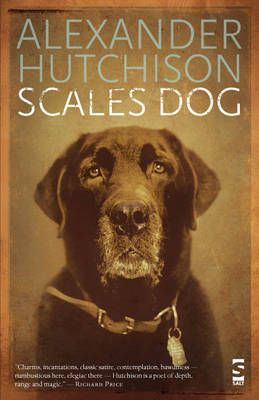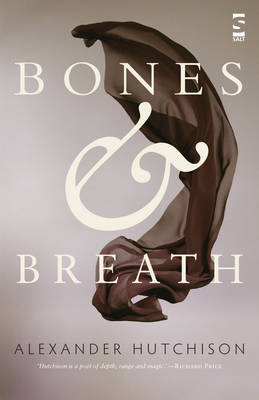Salt Modern Poets
2 total works
Scales Dog provides a selection of Hutchison’s work from Deep-Tap Tree (1978) to his most recent collection Carbon Atom (2006). The earliest poem “Mr Scales Walks His Dog” was written in Canada in 1970, following the poet’s arrival there from Scotland in 1966. At the time Michael Ondaatje said :”I love that poem” – and Lawrence Ferlinghetti, hearing the piece at a public reading in British Columbia, announced as soon as he came to the mike: “I dug that dog!”
Deep-Tap Tree was written during the seventies while Hutchison was living and working on Vancouver Island. Of that first book, the distinguished critic Richard Ellmann wrote: “Mr Hutchison is his own man, individual in temperament, pungent and accurate in expression. His work is compounded of wit and mystery, and delights his readers even as it teases them into self-recognition”.
Ellmann’s comments suggest that the appeal of Hutchison’s poems is both direct and indirect: being not only satirical and intelligent but also mysterious and moving. Another American reviewer found that variety a cause for celebration: “In a time of too much plain and too often poverty-stricken verse, Hutchison’s poetry looks and sounds bravely alive, colourful and crafted”. Underlining this positive reception across the Atlantic, the poet Robert Creeley said: “Sandy Hutchison’s poems read brightly, with a fine economy and precision. There is humor and warmth, an ear for clear edges of sound, and a pace that can hold all together”.
These responses were echoed in the UK when The Moon Calf and the pamphlets Epitaph for a Butcher and Sparks in the Dark were published after Hutchison’s return to Scotland in 1984. Gavin Ewart found the work: “Sharp, dark, funny – and with more vigour than almost all those usually singled out for praise.” Writing in Lines Review the poet George Bruce declared: “There is no questioning [his] verve, inventiveness and versifying skills. There’s been nothing quite like this since Sidney Goodsir Smith’s Under the Eildon Tree. Hutchison’s poems ... are in the same witty, brio tradition”.
Singling out “An Ounce of Wit to a Pound of Clergy” – which is the opening poem in the collection Carbon Atom, and was published as a pamphlet by Gael Turnbull – Ian Hamilton Finlay said: “The Hutchison piece is fascinating to me ... really good, energetic, knotty, interesting”. Gael Turnbull added his own praise when invited to comment on on early draft of Scales Dog by writing: “There are a dozen or so poems in the collection which register for me as having a totally unique quality, a momentum and richness, an energy and an edge, quite unlike anything I know written by anyone else”.
Recently, Hutchison’s work has sparked a response from a broader audience, and he is recognised by contemporary writers as a poet whose work has cut its own channels gradually, and is steadily gaining in reputation.
Scales Dog is a book which ranges widely with invention and delight. It is distinctively Scottish in some respects – but the appeal is international. It has depth and humour to carry its readers all the way through.
People want pleasure from poetry, and in Bones & Breath – this masterly collection from Alexander Hutchison – they will find it in many forms and registers. Power and beauty, mischief and humour. Longer poems mix satire with tender affection. Others offer everything from solar loops to red-throated divers.
The opening section of the book provides a scattering of poems in shorter forms, characteristically “elegant, humourous and deft by turns” as David Kinloch described elements of earlier work, and it contains several striking pieces, such as “Gavia Stellata” (“smallest/and brightest/and speckled/with stars”), a sharp catalogue of uncustomary characters in “Tabouleh” – and the informative and affecting “Parable of the Willow”.
A longer piece in several short parts – “Camp Four” – is picked out next, where satire and wry speculation are combined, and in a typical positive twist at the end we get not only a hint to sort out what has gone before, but the possibility of something “reverberant/resounding”.
Section 3 opens with “Out of Magma: the Moon, a Witness” a beautiful and startling account of something that happened on the slopes of Etna one winter recently – never to be forgotten by the observer, and surely affecting us all. There are, too, here several poems in Scots: building on a welcome extended in “Aye, Plenty, an Mair” in the opening section of the book. These are riddling, droll, foul, inventive and hilarious by turns, and the mix of native, demotic speech and sophisticated fancy takes us up and down some strange wynds and byways.
There is also a longer sequence, “Matter and Moisture”, which sets out a view of the world – even proffering advice – in a fashion that is mischievous, focussed and beguiling all at once.
Rounding things out in Section 3 are “Tod” – where a fox heads with real purpose into one of the Galleries off the Mound in Edinburgh – and “Everything” – a poem given a broad and popular endorsement from audiences of all sorts since its creation early in 2013.
Section 4 is made up of a long poem “Setting the Time Aside” which is a tribute to and engagement with the shade of a great poet from the last century: encountered on his home patch, quizzed and reckoned with, sounded out and given tribute, before a memorable and moving rapprochement.
One of the features of Bones & Breath as a collection is the range of personae – voices of birds, creatures, a tree, for example, as well as a mixed choir of accents and registers – and the oddest, and certainly the tiniest is saved for last.
In Section 5, “Tardigrade” a real (oh, aye) microscopic animal sets out a description of itself in illuminating, if not always pleasant, detail, and in addition provides an appraisal of us: wondering, not unreasonably, how we compare and what we might become. Since it turns out the beastie has more than an edge on us in terms of its capacity to survive, what it recommends should not, perhaps, be lightly dismissed. In any event, “Tardigrade” offers scope – even vision – beyond our current perspectives.

